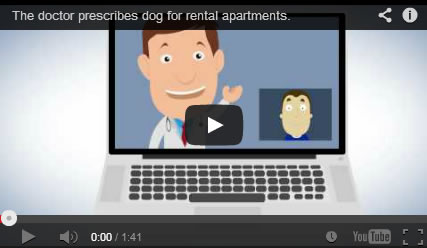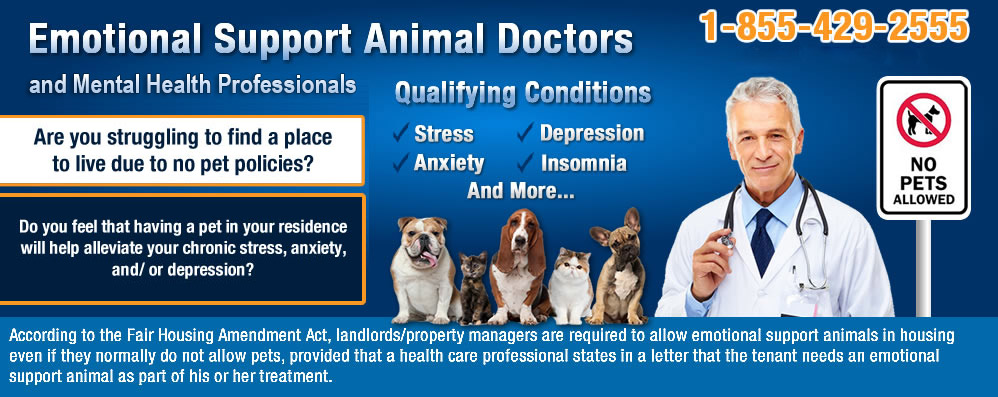Contents
ESAs for Emotional & Mental Support
Emotional support animals (ESAs) can help many people deal with a wide variety of mental health & emotional disorders, such as anxiety, PTSD, and depression.
If you feel that you could use the companionship and love of an emotional support animal that can live with you (even in “no pets allowed” housing) and travel with you in the cabin of commercial airplanes, you will need an emotional support animal letter. ESA letters are written by licensed mental health professionals.
Getting Your ESA Letter
If you have an existing relationship with a licensed mental health professional, and they have experience writing ESA letters, visiting them is your first step in getting an official emotional support animal. Be aware that some medical professionals are not supportive of ESAs, preferring to prescribe medication and traditional therapy.
If you do not have a relationship with an appropriate healthcare practitioner, if your mental health practitioner is not well-versed in preparing proper ESA letters or is not a believer in ESAs, the DOGtor can help.
There are a number of requirements for a proper ESA letter. One of the primary requirements is that your licensed mental health professional must indicate that you need an emotional support animal as part of a disorder that is listed in the Diagnostic and Statistical Manual of Mental Disorders (DSM), version 4 or 5.
Qualifying Conditions
There are over 150 disorders from the DSM-5 that can qualify you for an emotional support animal. Although Emotional Support Animal assessments are very personal and specific, for basic understanding, some of the types of disorders that commonly appear on ESAs include:
Anxiety Disorders
Specific psychiatric disorders that involve extreme worry or fear including:
- Generalized anxiety disorder (GAD)
- Panic disorder and panic attacks
- Separation anxiety
- Specific phobias, such as trypanophobia (fear of injections) and acrophobia (fear of heights)
The support and love offered by an emotional support animal can ease anxiety and accompanying fears.
Attention-Deficit/Hyperactivity Disorder (AD/HD)
A neurobiologically-based developmental disability characterized by behavioral problems such as:
- Difficulty paying attention
- Impulsivity
- Following instructions
- Social interactions
An emotional support animal can help calm and center a person with AD/HD.
Cognitive Disorders
Mental health disorders primarily affecting cognitive abilities such as:
- Memory
- Learning
- Problem solving
- Perception
The support and companionship offered by an emotional support animal can help build confidence and happiness.
Depression
A common but significant mood disorder that can interfere with daily functioning due to a persistent:
- Feeling of sadness, anxiousness or emptiness
- Feeling of pessimism or hopelessness
- Feeling of helplessness, worthlessness or guilt
- Inability to enjoy things previously enjoyed
An emotional support animal can help motivate a depressed person with love, joy and enthusiasm.
PTSD
Post Traumatic Stress Disorder, a mental health condition triggered by witnessing or experiencing a horrifying event and experiencing symptoms, such as:
- Emotional numbness, avoiding reminders of the traumatic event
- Intrusive, upsetting recollections of the event with nightmares or flashbacks
- Elevated arousal such as difficulty sleeping and concentrating
- Increased irritable or aggressive behavior
An emotional support animal can help calm and reassure a person with PTSD.
Social Anxiety Disorder
A mental health condition characterized by a powerful, unrelenting fear of being watched and judged by others, resulting in
- Being self-conscious in everyday social situations
- Avoiding meeting new people
- Being afraid of the judgement of others
- Expecting public humiliation
An emotional support animal can help build confidence and act as an “ice-breaker” for people with social anxiety disorder.
A Fast, Easy & Affordable Solution
If you’re ready for an emotional support animal, one of the fastest and easiest ways to get a proper ESA letter is through the DOGtor. We’ve helped tens of thousands of Americans get their ESA letters through our extensive referral network of mental health professionals who support the validity of emotional support animals. The DOGtor process is quick, simple, and has a same-day 100% refund guarantee.













